The Chairman of the Federal Inland Revenue Service (FIRS), Dr. Zacch Adedeji, has raised concerns over the allocation of 70% of value-added tax (VAT) proceeds to Lagos, Rivers, and the Federal Capital Territory (FCT).
He described the current system as unjust to the remaining 34 states in the country.
Adedeji made this bold statement on Monday during an interactive session with members of the House of Representatives on the proposed tax reform bills.
He revealed that just last Friday, he signed off 42% of October’s VAT proceeds to Lagos State alone.
This allocation, he said, reflects a structure that benefits a few states at the expense of others.
Adedeji explained that Lagos (42%), Rivers (16%), Oyo (5.2%), and the FCT (10%) collectively take over 70% of VAT proceeds.
He attributed this to the concentration of the head offices of major revenue-generating companies in these regions.
“The current structure does not represent the interest of the President or the nation,” he lamented.
He illustrated his point by citing the telecommunications giant, MTN, which generates significant VAT revenue in Lagos due to its head office location.
According to Adedeji, MTN’s services are consumed nationwide, yet Lagos reaps the benefits.
“Seventy percent of Nigerians consuming these products are spread across the country, not just in Lagos or Rivers,” he added.
Northern States Left Behind
Adedeji’s comments highlighted the glaring disparity in VAT distribution across states.
While Lagos enjoys 42% of VAT proceeds, states like Borno and Bauchi receive only 0.32% and 0.4%, respectively.
“This kind of disparity makes me question if I am truly serving as a Nigerian,” Adedeji said passionately.
He called for urgent reforms to ensure a fairer distribution of VAT based on consumption rather than company headquarters.
The proposed tax reform bills, he said, aim to correct this imbalance and create a system that benefits all states.
“Whatever way you look at it, apart from Lagos, Rivers, and FCT, every northern state would gain from this reform,” Adedeji argued.
He added that the reforms would distribute resources more equitably, irrespective of a state’s economic situation.
Lawmakers Divided
The FIRS boss’s comments sparked mixed reactions from lawmakers.
Some applauded his stance, while others raised concerns about the potential impact of the reforms.
Babajimi Benson, a representative from Lagos, voiced apprehension about how the changes could affect his state’s revenue.
Similarly, Adamu Yusuf Gagdi, representing Plateau State, questioned how conflict-displaced citizens in the North could benefit from VAT proceeds tied to consumption.
Gagdi argued that many northern residents are unable to engage in significant consumption due to insecurity and displacement.
Adedeji, however, stood firm, insisting that the reforms were necessary to promote fairness.
“No matter the challenges, we must change this structure to reflect equity,” he emphasized.
Calls for Unity and Fairness
Adedeji expressed confidence in the President’s vision to ensure equitable resource distribution across the federation.
He stressed that the reforms are not targeted at undermining any state but are designed to foster national unity.
“This is about building a system that reflects our prayers as a nation—one of fairness and equity,” he stated.

